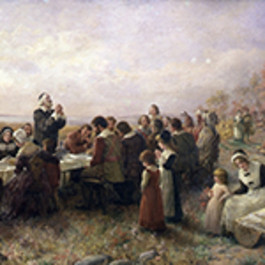Pilgrims All Are We

 Nathaniel Philbrick, in Mayflower, his acclaimed history of the Pilgrims, recounts how William Bradford, the intrepid leader of that courageous band of Puritans, years later described “that first morning in America.” Recalling with wonder their landing on the salty, windswept shores of Cape Cod Bay on November 15, 1620, Bradford wrote: “But here I cannot stay and make a pause and stand half amazed at this poor people’s present condition. . . . They had now no friends to welcome them nor inns to entertain or refresh their weather-beaten bodies; no houses or much less towns to repair to, to seek for succor. What could sustain them but the spirit of God and His Grace? May not and ought not the children of these fathers rightly say: ‘Our fathers were Englishmen which came over this great ocean, and were ready to perish in this wilderness; but they cried unto the Lord, and He heard their voice and looked on their adversity’” (46). His words are appropriate, not only because we celebrate the nearly four-century tradition of the Pilgrims’ thanksgiving this week. But in Bradford’s description—“they cried unto the Lord, and He heard their voice and looked on their adversity”—perhaps we also hear the faint hint of a day of adversity yet coming upon this land of the Pilgrims. Who wants to be a naysayer on such a blessed and bountiful holiday weekend like this? But the gyrating marketplace, the mad scramble of consumerism, the insufferable political debate over this proud nation’s responsibility to the weakest and poorest (and sickest) among us, the yawning chasm between the haves and the have-nots in America—one perhaps could be excused, even on a holiday weekend, for wondering if this Land of the free has already seen her best days. Scribbled on the page of Revelation 13 in my Bible are these words written a century ago: “The Lord has done more for the United States than for any other country upon which the sun shines” (Ms 17, 1906). Hardly a prideful claim of superiority or grounds for national arrogance, this quiet observation simply declares a common truth that this country has enjoyed the uncommon blessings of Providence. And in the sunlight, how easy is the spirit of thanksgiving. But should the days turn dark and the supernal blessings wither away, what shall we be grateful for then? A year after their landing, the Pilgrims gathered for that first thanksgiving—half of their band already buried beneath the Massachusetts sod. Yet they gave thanks to God. And so must we—no matter the uncertain voyage that spreads before us, nationally or personally. The Almighty is still that. And in the darkest storm His mercy will yet triumph. Just look at Calvary. “Oh, give thanks to the LORD, for He is good! For His mercy endures forever” (Psalm 136:1 NKJV).
Nathaniel Philbrick, in Mayflower, his acclaimed history of the Pilgrims, recounts how William Bradford, the intrepid leader of that courageous band of Puritans, years later described “that first morning in America.” Recalling with wonder their landing on the salty, windswept shores of Cape Cod Bay on November 15, 1620, Bradford wrote: “But here I cannot stay and make a pause and stand half amazed at this poor people’s present condition. . . . They had now no friends to welcome them nor inns to entertain or refresh their weather-beaten bodies; no houses or much less towns to repair to, to seek for succor. What could sustain them but the spirit of God and His Grace? May not and ought not the children of these fathers rightly say: ‘Our fathers were Englishmen which came over this great ocean, and were ready to perish in this wilderness; but they cried unto the Lord, and He heard their voice and looked on their adversity’” (46). His words are appropriate, not only because we celebrate the nearly four-century tradition of the Pilgrims’ thanksgiving this week. But in Bradford’s description—“they cried unto the Lord, and He heard their voice and looked on their adversity”—perhaps we also hear the faint hint of a day of adversity yet coming upon this land of the Pilgrims. Who wants to be a naysayer on such a blessed and bountiful holiday weekend like this? But the gyrating marketplace, the mad scramble of consumerism, the insufferable political debate over this proud nation’s responsibility to the weakest and poorest (and sickest) among us, the yawning chasm between the haves and the have-nots in America—one perhaps could be excused, even on a holiday weekend, for wondering if this Land of the free has already seen her best days. Scribbled on the page of Revelation 13 in my Bible are these words written a century ago: “The Lord has done more for the United States than for any other country upon which the sun shines” (Ms 17, 1906). Hardly a prideful claim of superiority or grounds for national arrogance, this quiet observation simply declares a common truth that this country has enjoyed the uncommon blessings of Providence. And in the sunlight, how easy is the spirit of thanksgiving. But should the days turn dark and the supernal blessings wither away, what shall we be grateful for then? A year after their landing, the Pilgrims gathered for that first thanksgiving—half of their band already buried beneath the Massachusetts sod. Yet they gave thanks to God. And so must we—no matter the uncertain voyage that spreads before us, nationally or personally. The Almighty is still that. And in the darkest storm His mercy will yet triumph. Just look at Calvary. “Oh, give thanks to the LORD, for He is good! For His mercy endures forever” (Psalm 136:1 NKJV).